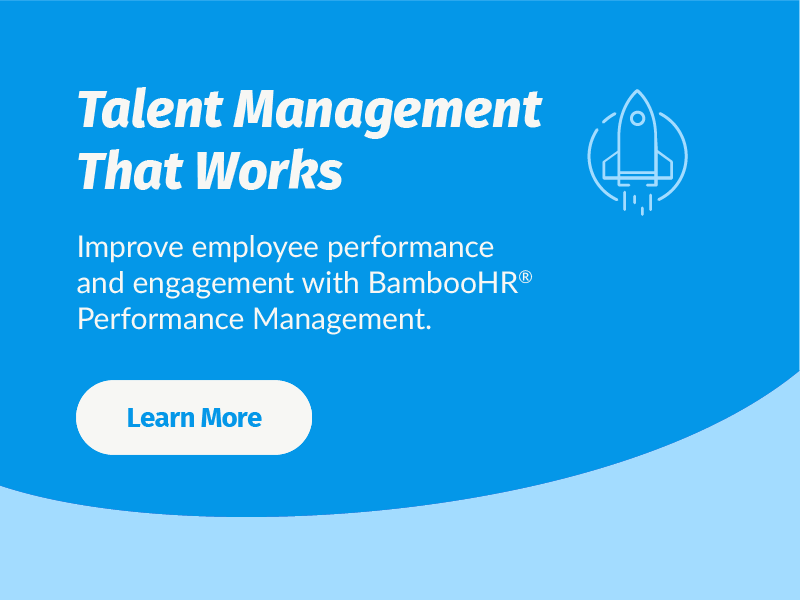Better Ways to Manage Employee Performance Reviews
The dreaded performance review—an annual ritual that unifies employees and managers alike in their mutual dislike for a necessary evil. And the worst part? After the challenges of performance management absorb the time, energy, and effort spent by employees and management, very few feel the process was worth their while.
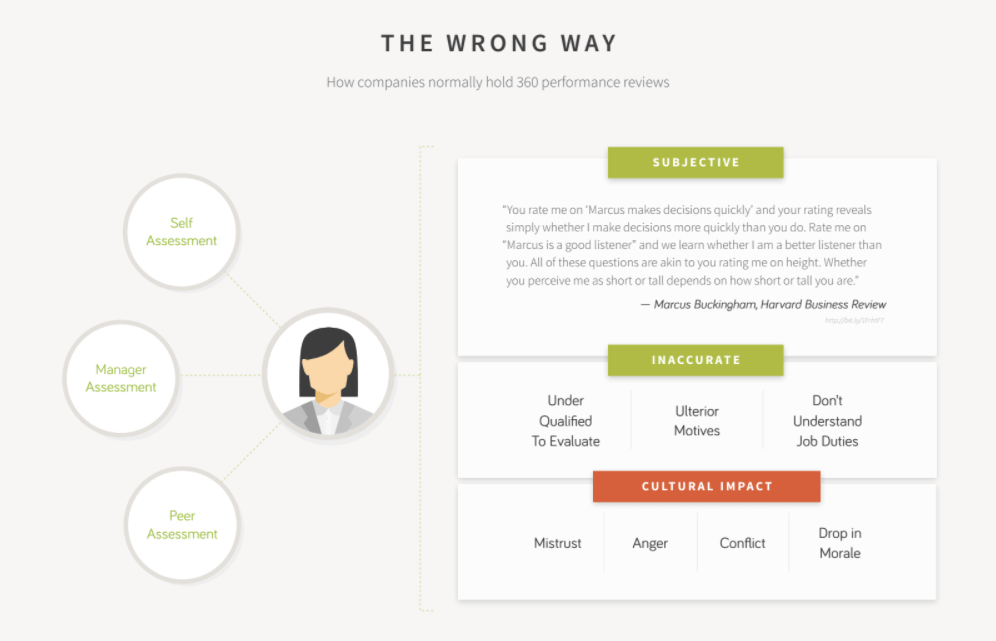
The Broken System of Performance Reviews
To be honest, in large part, performance reviews are a broken system, dating back to the industrial revolution, when employees were seen as replaceable parts in a machine, not knowledge workers who innovate a company. GE, the original champion of performance reviews and forced rankings, recently announced they are abandoning the process because it hurts performance.
Only 6 percent of companies believed their performance reviews were worth the time. —Deloitte
Although some call for the death of the performance review, it’s been proven they can provide considerable value to a company when done well. So many crucial decisions hinge upon performance reviews—promotions, bonuses, disciplinary action, employee development, and terminations. But several factors cripple their effectiveness:
· Purpose: Although the purpose is built into the name (to review performance, obviously), employees and management mostly use annual reviews to focus on qualifications for promotions and raises.
· Time: Before restructuring their process, Deloitte spent 2 million man-hours a year on filling out forms, meetings, and creating rating systems for their performance reviews.
· Frequency: Holding reviews once a year doesn’t allow managers to provide relevant feedback to foster employee growth. Nor does it allow managers the ability to reward employees for excellent work in real-time.
· Subjectivity: Like teachers, some managers “grade” harshly and some give “A’s” to anyone who shows up. And employees, who either don’t want to jeopardize career advancement or a co-worker’s position, often sugarcoat their feedback about managers and peers rather than tell the truth.
BambooHR’s Performance Management is not only built around industry research but also our own customer research where we uncovered best practices from scores of innovative companies. Using this research, we’ve removed those crippling factors found in the purpose, time, frequency, and subjectivity of performance reviews. By doing so, we’ve transformed them into a rewarding (dare we say, enjoyable?) experience.
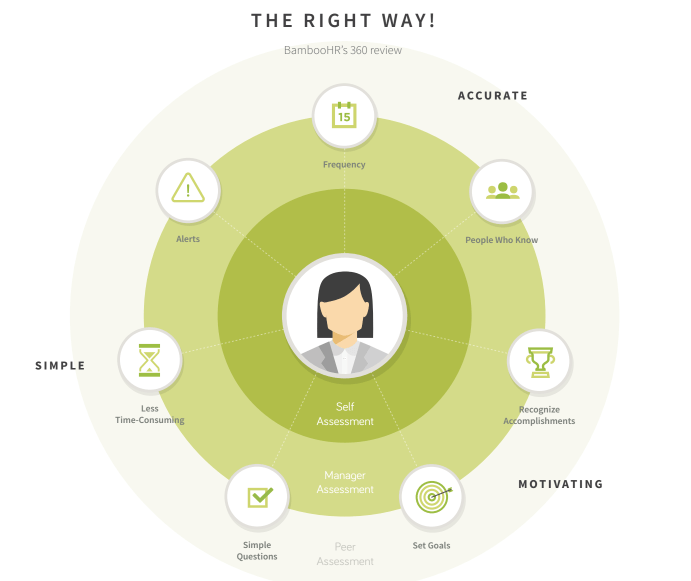
Purpose
Shifting the focus to evaluating engagement and productivity will give you the data to make those crucial decisions, like promotions. It will also help you determine how happy and engaged your employees are.
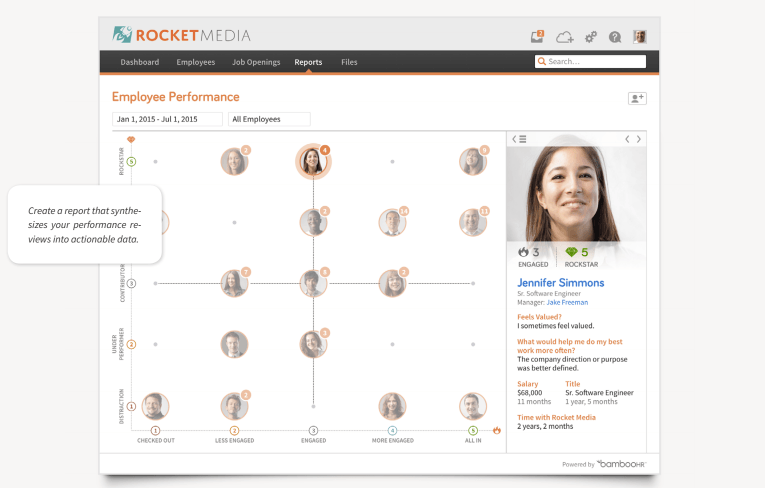
Time
Employees and managers spend a short amount of time electronically completing reviews with questions targeted to extract the most valuable feedback. You can then generate professional reports based off these reviews to measure employee engagement, productivity, and cultural fit.
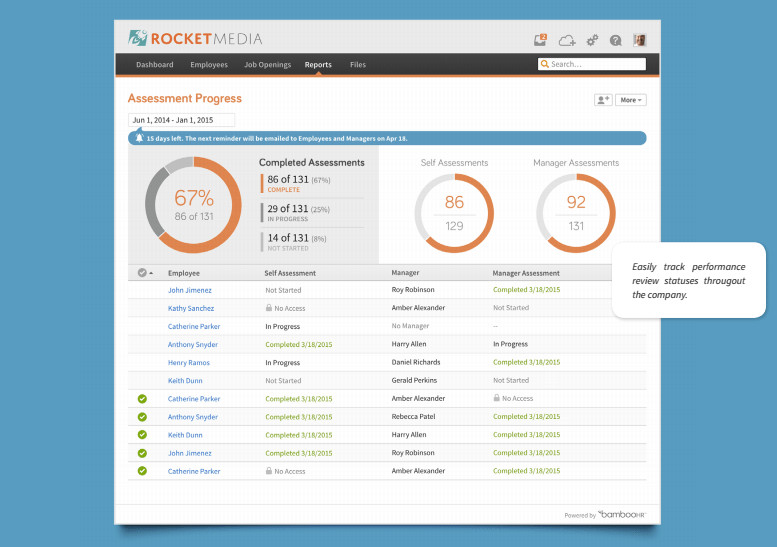
Frequency
Our performance reviews are designed to occur several times a year (or however often you like), allowing managers to give frequent feedback and make changes in real-time. This gives performance reviews the most impact. In fact, GE has chosen to replace what they consider a broken performance review system with one that uses frequent feedback.
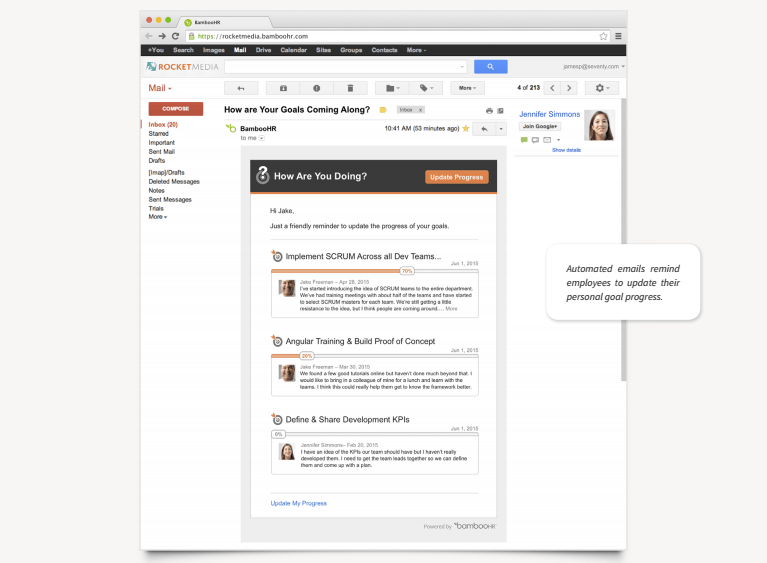
Subjectivity
By asking managers what actions they would take to keep an employee rather than how they feel about an employee, we cut through any subjective feedback and get to the heart of the matter. What about sugar coated feedback from employees in their manager and peer to peer evaluations? Our evaluation questions are based off of research done by Deloitte showing that a company’s happiest employees have these three traits in common:

By using these criteria to measure engagement, employees can be honest without feeling like they’ve put their career at risk.
Sample Performance Review Questions
An effective performance review brings the employee and manager together and aligns their goals with those of the company. The right performance review questions are vital to bringing everyone in the company on the same page and working toward the same objectives.
First, it’s important to realize that a performance review isn’t just for the employee—it’s a great way to find out if managers and the company as a whole are on the right track. You want to solicit good feedback from your employees, and having tried-and-true questions is a good way to do that.
Here are some sample performance review questions that you can use as a model. Each follows one of the three traits that are in common with the happiest employees.
These questions help determine if your employee feels like they have an opportunity to do what they do best, everyday:
- What are your professional goals for the next six months?
- What job tasks do you enjoy the least?
- What job tasks do you enjoy the most?
- Do you feel that your job tasks are using all of your talents and skills effectively?
These questions help determine if their co-workers are committed to great work:
- What are the strongest motivators that make you want to come to work every morning?
- What are some of the things that make you not want to come to work?
- What do you appreciate most about our workplace/team?
- What are the biggest things that prevent you from getting your work done?
These questions help determine if an employee believes in the company’s mission:
- Do you understand why we use our practices and processes in the workplace?
- What would you change about our practices and processes?
- If you moved to a new position, what would it be?
Several of these questions feed into each other and can overlap with the other trait questions. Listen closely to the answers—the best questions are actually follow-up questions.
Good employee peer review questions will make your performance reviews better and will vastly improve how you and your employees respond to them. Use these questions and these tips to help you make performance reviews what they should be for your company.
Performance reviews don’t have to be a necessary evil dreaded by your entire company. Instead, they can become a tool that provides feedback you can actually use to measure engagement and performance. We provide analytics on that feedback in a clear, easy to consume format that allows you to know where to take action.
Get caught up every month on all things HR. Don't worry, we promise we won't spam you.



